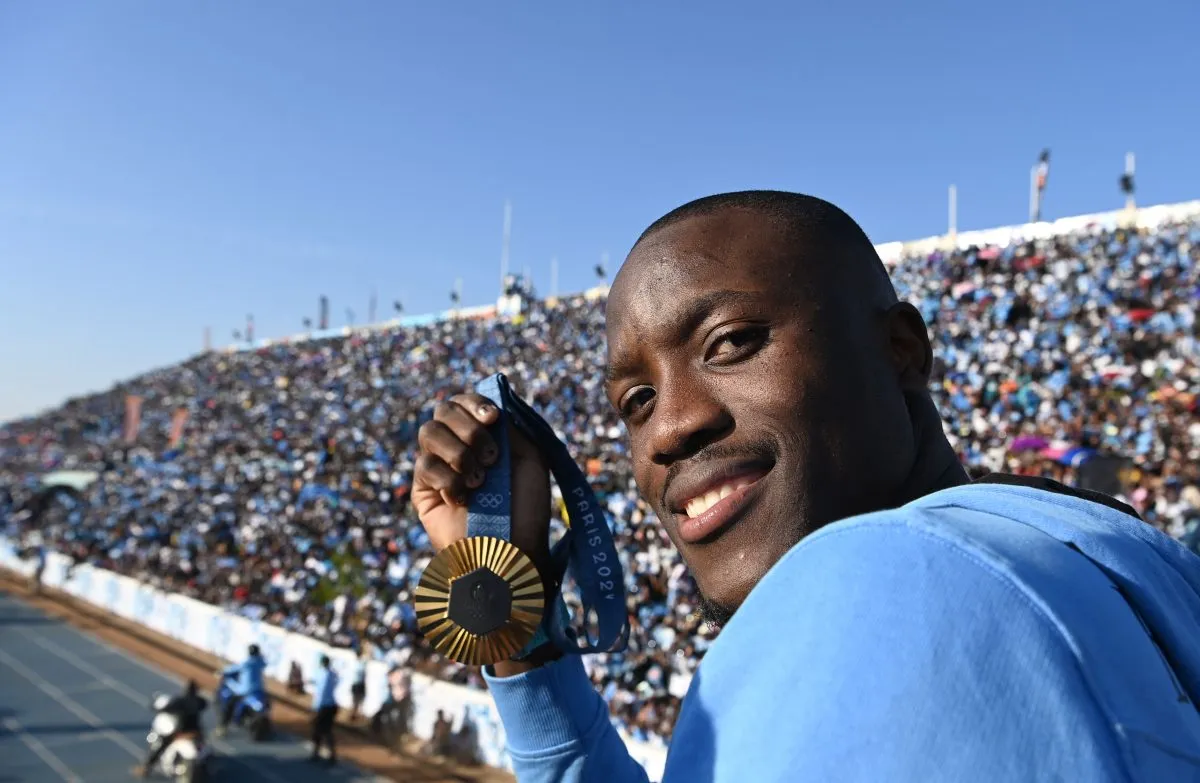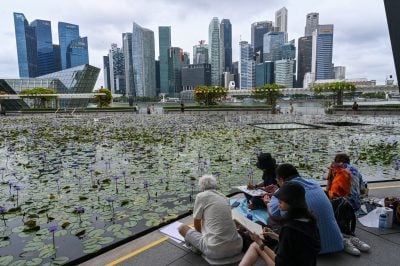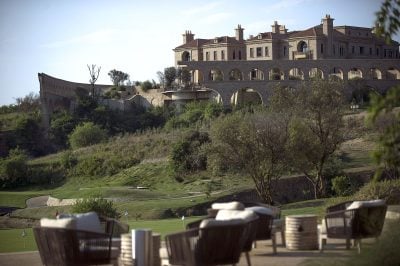African stars again shone brightly at the Olympic Games in Paris. Highlights include Kenya’s Beatrice Chebet taking double gold in the women’s 5,000 and 10,000 metres, Botswana’s Letsile Tebogo (pictured at his victory celebration in Gaborone) storming to victory in the men’s 200 metres, and Tamirat Tola setting a new Olympic record in the men’s marathon.
Their performances will undoubtedly inspire a new generation of African athletes. However, the likelihood that the continent’s next crop of Olympians will be able to compete at a games on African soil appear slim at best.
Africa is the only inhabited continent never to host a Summer Olympics. And the wait could extend for many more years. The next games, in 2028, will be held in Los Angeles. Four years later, it will be the turn of Brisbane (marking the third time Australia, a country of less than 30 million people, will host the Olympics).
Egypt is plotting a bid for the 2036 event in its still-unfinished and unnamed ‘new administrative capital’. It inaugurated a new athletics and football venue earlier this year in the city being built outside Cairo. But Egypt still has much work to do to convince the International Olympic Committee to take the risk of awarding the multi-billion-dollar event to a city where much of the wider infrastructure remains incomplete.
Financial burden
Africa does, of course, already have experience holding major international sporting events. South Africa hosted the men’s Rugby World Cup in 1995 and football’s FIFA World Cup in 2010. The latter event was the largest sporting extravaganza ever to take place on the continent. The FIFA World Cup will return to Africa in 2030, with Morocco joining co-hosts Spain and Portugal for a multinational tournament.
Other international sporting events to be held in Africa include the Cricket World Cup, hosted by South Africa, Zimbabwe and Kenya in 2003; football’s Club World Cup, held in Morocco in 2013, 2014 and 2022; and the legendary ‘Rumble in the Jungle’ boxing bout between George Foreman and Muhammad Ali, watched by 60,000 fans in Kinshasa in 1974.
The complexity of hosting a Summer Olympic Games would be of a different order of magnitude to any of these events.
An Olympic host must provide world-class venues across more than 30 sports, along with training facilities and accommodation for over 10,000 athletes, plus another 4-5,000 competitors in the Paralympics, and their coaching teams. Transport and hospitality infrastructure must be able to cope with a huge influx of foreign visitors (more than three million tickets at the Paris Olympics were sold to sports fans from outside France). Extensive public transport systems to shuttle spectators to the venues are a must-have, given the IOC’s efforts to promote sustainability at the Olympics.
The massive cost of hosting the games means that the Olympics has been almost entirely monopolised by wealthy countries. According to a report published by the Council of Foreign Relations in July, Paris spent $8.7bn on operational and construction costs for this year’s games, while Tokyo forked out $13.7bn for the delayed 2020 edition, and Rio de Janeiro splurged $23.6bn in 2016. These figures do not include wider investments in infrastructure indirectly linked to the Olympics.
Given the extraordinary price tag – which is much greater for host cities that have to build more infrastructure from scratch – African governments have been reluctant to seek hosting rights. The closest Africa has ever come to securing the games was when Cape Town bid to host the 2004 edition but lost out to Athens.
Ironically, the costs and corruption linked to that year’s Olympics played a role in Greece’s subsequent financial meltdown. The ‘white elephant’ venues that swiftly fell into disuse in the Greek capital stand as a warning sign to prospective Olympic host cities.
Bidding reforms
While the jury is out on whether the benefits of the games are worth the cost, reforms to the bidding process could make it more feasible for African cities to host the Olympics in future. Rattled by several candidate cities dropping out midway through the bidding processes for recent Summer and Winter Olympics, the IOC made extensive reforms to how the games are awarded in 2019.
Crucially, the Olympics no longer needs to be held in a single city. Instead, the IOC may allow several cities to share hosting rights, or award the games to “regions, states or countries”. This reform means an Olympic host could make use of existing venues throughout a country. Hypothetically, if South Africa was awarded the games, it could hold track cycling at the Bellville Velodrome in Cape Town, and swimming at the Kings Park Pool in Durban, for example.
This would potentially help to reduce the cost of constructing new venues, making Olympic bids more realistic for lower-income countries.
Meanwhile, the IOC is seeking to avoid the familiar bidding wars, in which prospective hosts make lavish promises to IOC delegates ahead of a vote seven years before the games. Instead, its new Future Host Commissions maintain dialogue with bidders and can make a recommendation on a preferred host to the IOC’s executive board much further in advance. This should also allow host cities more time to prepare where needed. Brisbane, for example, was chosen 11 years before the 2032 Olympics.
On the other hand, the IOC’s emphasis on making use of existing infrastructure potentially disadvantages emerging economies that would need to build venues from scratch.
Nevertheless, the prestige associated with the Olympics means that hosting rights remain a much-coveted prize. Future African bids will have to overcome competition from the likes of India, Indonesia, Turkey and Middle Eastern states such as Qatar, all of which have suggested they will enter the fray to host future editions.
This time for Africa?
So, if Africa does launch a more serious attempt to win the Olympics, where could be in line to welcome the games to the continent?
Even if the 2036 games comes too soon for Egypt’s new administrative capital, the North African country will be well-placed to bid for future games as it modernises its infrastructure. Mustapha Berraf, head of the Association of National Olympic Committees of Africa, said earlier this month that an Egyptian bid was “most likely” to succeed in 2040.
Major South African cities, particularly Johannesburg or Cape Town, would be an obvious alternative. They already possess extensive hospitality infrastructure and boast a range of high-quality venues. However, South Africa’s credibility as an Olympics host may have been dented by Durban backing-out of holding the Commonwealth Games (the largest multi-sport event after the Olympics) in 2022, after initially being awarded hosting rights.
Morocco would be another option. Casablanca is a significant air travel hub, offers extensive tourist accommodation and will gain further experience in hosting major events at the 2030 World Cup.
Long-shot bids could come from the likes of Nairobi, which was heavily favoured to host the 2025 World Athletics Championships before being pipped to the event by Tokyo. The sight of athletics events being held in the spiritual heartland of long-distance running would certainly be a mouth-watering prospect. However, the East African country would need to invest massively in its wider infrastructure to have a realistic chance of convincing the IOC it is ready for the games.
Want to continue reading? Subscribe today.
You've read all your free articles for this month! Subscribe now to enjoy full access to our content.
Digital Monthly
£8.00 / month
Receive full unlimited access to our articles, opinions, podcasts and more.
Digital Yearly
£70.00 / year
Our best value offer - save £26 and gain access to all of our digital content for an entire year!

 Sign in with Google
Sign in with Google 



